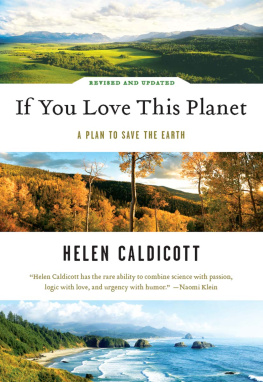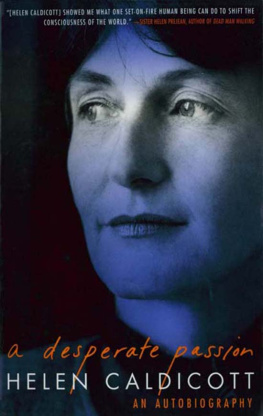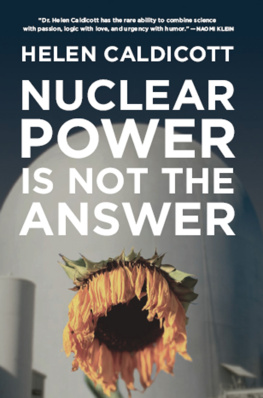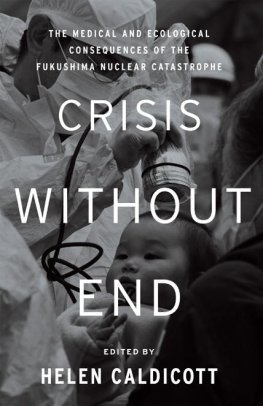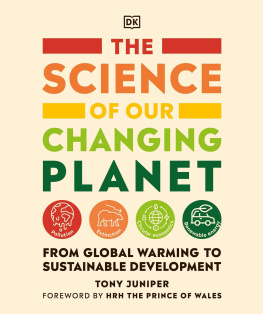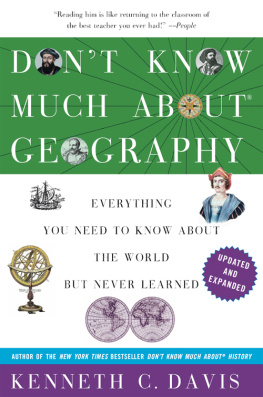W. W. NORTON & COMPANY
For information about permission to reproduce selections from this book, write to Permissions, W. W. Norton & Company, Inc., 500 Fifth Avenue, New York, NY 10110
Caldicott, Helen.
If you love this planet: a plan to heal the earth / Helen Caldicott.
Rev. and updated.
p. cm.
Includes bibliographical references.
ISBN: 978-0-393-07270-9
1. Pollution. 2. International business enterprisesEnvironmental aspects. 3. Environmental protection. I. Title.
TD174.C33 2009
363.7dc22
W. W. Norton & Company, Inc.
500 Fifth Avenue, New York, N.Y. 10110
www.wwnorton.com
W. W. Norton & Company Ltd.
Castle House, 75/76 Wells Street, London W1T 3QT
Introduction
The only thing necessary for the triumph of evil is for good men to do nothing.
Edmund Burke
I first visited the United States in 1966, when I was a conservative young mother with three babies and a new medical degree. I took a job at Harvard Medical School, in the cystic fibrosis clinic of the Childrens Hospital Medical Center, and worked part-time while continuing to care for my children. Because of the American films and television shows that I had grown up watching in Australia, I expected a gangster to be lurking behind every lamppost and the streets to be filled with neon lights and fast-food joints. Instead, I found the beautiful, orderly villages of New England and the quiet, reserved, but deeply caring people of Down East and Boston.
The years 196669, however, were years of political turbulence and violence. I witnessed the antiVietnam War movement, heard protest songs on the radio, watched flower children on television, and wept into my ironing as I listened to George Wald deliver an incredibly powerful and moving address on the day of the 1969 antiwar moratorium at the Massachusetts Institute of Technology.
In March of 1968, I heard the redoubtable Louis Lyons raging one night on the radio as he described the killing of Martin Luther King, Jr., exhorting all of us to march in the streets against such iniquity. A few months later, one sultry Boston summer morning, I turned on the television to see Bobby Kennedy lying bleeding from the head on the floor of a Los Angeles hotel. I found myself screaming at the TV, Not again! Several days later, I drove up to the Berkshires listening to the broadcast of his funeral from St. Patricks Cathedral, and wept as the choir of nuns burst into the Hallelujah Chorus from Handels Messiah .
With a sense of dread, I saw Richard Nixon elected to the presidency that fall. Impelled by a growing desperation, I wrote to him about the cold war and the Anti-Ballistic Missile (ABM) Treaty, and I am sure that he used part of my letter in his inaugural address. I even wrote to Senator Edward Kennedy about my deep concern about nuclear war and the importance of the upcoming ABM Treaty, and he actually replied with a thoughtful letter, which excited this rather nave young doctor from Down Under.
It was a thrilling time for me. Radicalized politically, I realized that democracy was a workable proposition, because the turmoil seemed to be igniting change. Anything, I thought, was possible.
In 1969, I returned to Australia and two years later successfully took on the French government, which was testing nuclear weapons in the atmosphere over some remote Pacific islands. The French tests violated the Partial Test Ban Treaty and created radioactive fallout in my small city of Adelaide, in South Australia. After nine months of a public education campaign warning about the medical dangers of strontium-90 and radioactive iodine in mothers milk, 70 percent of my fellow Australians rose up and demanded that our government take action to stop the tests. The government did so, and the French were forced to test underground. I had been transformed into an activist in the United States, and my life was never to be the same again.
I have a deep regard for America as a land of excitement, change, and opportunity. It is also the country that will determine the fate of the Earth. Why do I make such a sweeping statement? Because the United States is the wealthiest and militarily the most powerful country, and because its powerful media penetrates into every corner of the world, establishing the models that most people wish to emulate. Thanks to its influence, millions of Chinese, Africans, Indians, and Latin Americans want cars, refrigerators, ice cubes in their Coke, air conditioners, and disposable packaging.
Because the US population represents only 4 percent of the Earths people but uses 23 percent of the energy, this lifestyle is not an appropriate model for billions of other people. Such extravagant living is the leading cause of ozone depletion; global warming; toxic pollution of the air, water, and soil; and nuclear proliferation. Each US resident causes twenty to a hundred times more pollution than any Third World resident does, and rich American babies are destined to cause a thousand times more pollution than their counterparts in Bangladesh or Pakistan.
Some eminent scientists predict that if we do not act now to reverse the cumulative effects of global pollution, species extinction, overpopulation, and the ongoing nuclear threat, it will soonpossibly within ten yearsbe too late for the long-term survival of most of the planets species, perhaps even Homo sapiens .
My vocation is medicine, and as a physician I examine the dying planet as I do a dying patient. The Earth has a natural system of interacting homeostatic mechanisms similar to the human bodys. If one system is diseased, like the ozone layer, then other systems develop abnormalities in functionthe crops will die, the plankton will be damaged, and the eyes of all creatures on the planet will become diseased and vision-impaired.
We must have the tenacity and courage to examine the various disease processes afflicting our planetary home. But an accurate and meticulous diagnosis is not enough. We never cure patients by simply announcing that they are suffering from meningococcal meningitis or cancer of the bladder. Unless we are prepared to look further for the cause, or etiology, of the disease process, the patient will not be cured. Once we have elucidated the etiology, we can prescribe appropriate treatments.
Unfortunately, the etiologies of the diverse diseases afflicting our planet are complex and difficult to face when examined in fine detail. The initial, wondrous promises of capitalism and corporate free enterprise have not always led to careful and responsible management of the Earths natural resources and treasures. And the ills of communism led in many cases to disastrous pollution and wanton neglect of nature.
In this book, I outline the diagnosis of planetary ills and then analyze the causes of these diseases. This discussion involves a critical dissection of transnational corporations and their impact on US society and the world at large. It also includes a brief analysis of the now defunct communist system relating to pollution and ecological damage.

